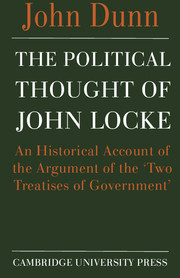 The Political Thought of John Locke
The Political Thought of John Locke The worthy, if slightly bumbling Locke we all used to know (just as we know that he wrote in defence of that worthy if slightly bumbling apotheosis of English constitutionalism, the Glorious Revolution) wrote to answer the terrible, if undeniably clever Hobbes. Both of these hallowed opinions were vigorously attacked by Mr Laslett in his edition of the Two Treatises and the attacks had an immediate impact. But, rather surprisingly, the complicated and difficult historical demonstration that the bulk of the work was written several years before the Revolution rapidly became the new orthodoxy, while the simple and wholly convincing dialectical demonstration that the shape of the Two Treatises was dictated by the attempt to answer Sir Robert Filmer's political tracts has never received a very enthusiastic response and its importance scarcely been sympathetically understood. One reason for this curious difference in the two responses, perhaps, is rather vulgar. The recognition that the Two Treatises was not the rationalization of a successful revolution in the past at most implied the abandonment of a particular historical doctrine about a single figure; brashly, it meant rewriting one lecture. But the historically supported argument that lining Locke up against Hobbes and comparing their various dimensions was not the way to approach the study of Locke (indeed, at its most disturbing, perhaps not even a way) had altogether more sinister implications.
To save this book to your Kindle, first ensure no-reply@cambridge.org is added to your Approved Personal Document E-mail List under your Personal Document Settings on the Manage Your Content and Devices page of your Amazon account. Then enter the ‘name’ part of your Kindle email address below. Find out more about saving to your Kindle.
Note you can select to save to either the @free.kindle.com or @kindle.com variations. ‘@free.kindle.com’ emails are free but can only be saved to your device when it is connected to wi-fi. ‘@kindle.com’ emails can be delivered even when you are not connected to wi-fi, but note that service fees apply.
Find out more about the Kindle Personal Document Service.
To save content items to your account, please confirm that you agree to abide by our usage policies. If this is the first time you use this feature, you will be asked to authorise Cambridge Core to connect with your account. Find out more about saving content to Dropbox.
To save content items to your account, please confirm that you agree to abide by our usage policies. If this is the first time you use this feature, you will be asked to authorise Cambridge Core to connect with your account. Find out more about saving content to Google Drive.